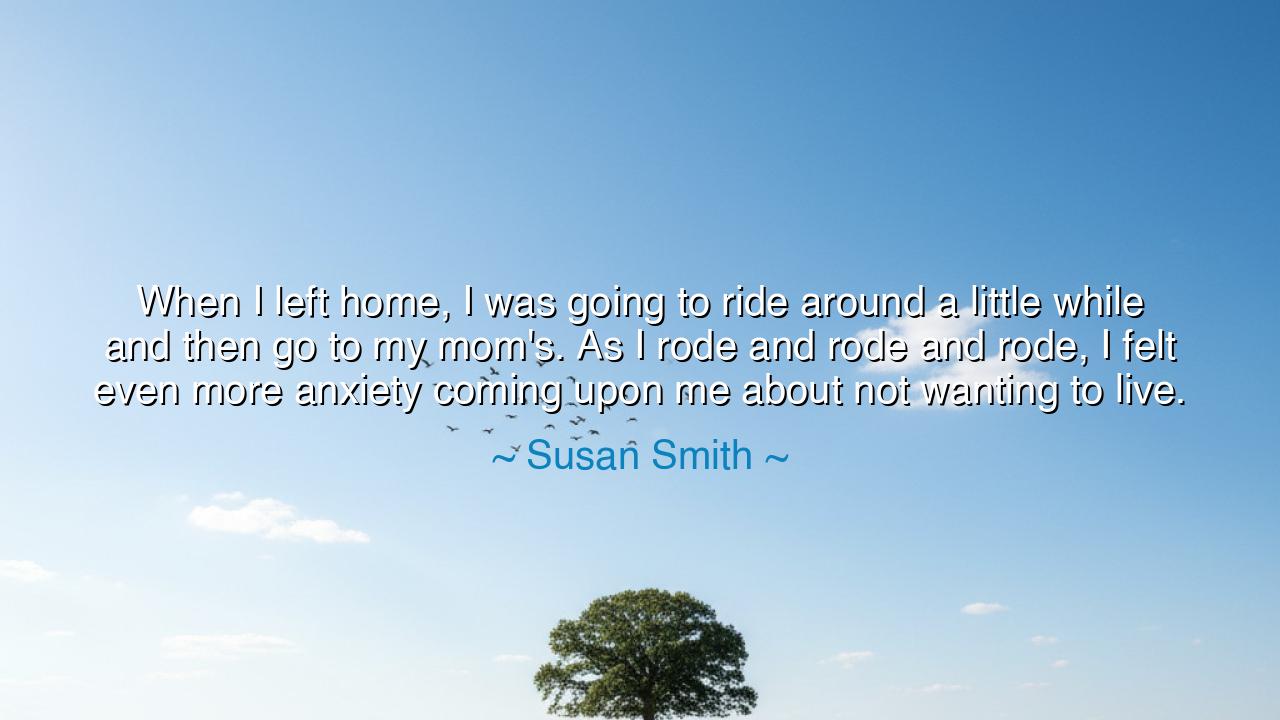
When I left home, I was going to ride around a little while and
When I left home, I was going to ride around a little while and then go to my mom's. As I rode and rode and rode, I felt even more anxiety coming upon me about not wanting to live.






“When I left home, I was going to ride around a little while and then go to my mom’s. As I rode and rode and rode, I felt even more anxiety coming upon me about not wanting to live.” — thus spoke Susan Smith, and in these words we encounter the cry of a soul drowning beneath its own burdens, a journey outward that mirrors a descent inward. This is not merely the tale of one woman but the shadowed story of all who have wrestled with despair, who have sought escape in movement yet found no refuge, because the torment rode with them in their own hearts.
To leave home is often symbolic: it is the attempt to leave behind one’s troubles, to seek another place where peace might be found. For Smith, the road stretched ahead like a promise of relief, yet the further she traveled, the heavier her anxiety grew. This teaches us that no distance can carry us away from the storms of the mind; they are relentless companions, following us no matter how far the wheels turn.
Her turning toward her mom’s house reveals another truth: in times of despair, the heart instinctively seeks its origins, the place of nurture, the sanctuary of maternal presence. Yet even this impulse, holy and human, could not silence her anguish. The longing for comfort wrestled with the voice of hopelessness, leaving her in the wilderness of her own thoughts. This is the tragedy she names: to desire life’s sanctuary, and yet to feel drawn toward its end.
History has shown us many such journeys. Consider Virginia Woolf, who filled her pockets with stones and walked into the river. She too had tried to outrun her anguish through work, travel, and conversation, but despair proved swifter. Or think of Seneca, the Stoic philosopher, who counseled endurance through suffering, yet whose own death was demanded by imperial order—he faced his end with composure, but not without the shadow of fate pressing heavy upon him. These stories remind us that despair is not the mark of weakness, but the great enemy that has haunted even the strongest souls across centuries.
The origin of Smith’s words lies in her attempt to explain her state of mind, to make others understand the storm that raged within. Though her later actions would cast a long and terrible shadow over her name, in this single moment her words are a stark revelation of the human condition. They remind us that despair does not begin in grand gestures, but in small decisions—a ride, a thought, a silence that grows until it engulfs the will to live.
The lesson is twofold: first, that despair thrives in isolation, in silence, in the endless circling of the mind. Second, that healing requires interruption—the courage to speak, to ask for help, to let another bear witness to the pain. Movement alone, as Smith discovered, cannot save us; only connection can. When the burden grows unbearable, the path forward is not to ride endlessly, but to turn toward others, to let the darkness be named aloud so that it loses its grip.
Practical action follows: if you feel the weight of despair, do not carry it alone. Speak to a friend, a parent, a guide, or even a stranger whose task it is to listen. If you see another lost in their silent journey, do not ignore them—walk beside them, ask the questions others fear to ask, offer the presence they may be too afraid to request. For often the difference between death and survival lies not in the strength of the sufferer but in the compassion of those who reach out.
Thus Susan Smith’s words, though born of tragedy, remain as a warning and a plea. To leave home, to ride endlessly, to feel anxiety pressing like an iron hand upon the heart—these are not signs of weakness but of the deep human struggle with despair. Let us learn from her sorrow: that the road alone cannot save us, but love, conversation, and presence can. Let us build lives where none must wander endlessly, feeling they no longer wish to live, but instead find companions strong enough to remind them of hope.






AAdministratorAdministrator
Welcome, honored guests. Please leave a comment, we will respond soon